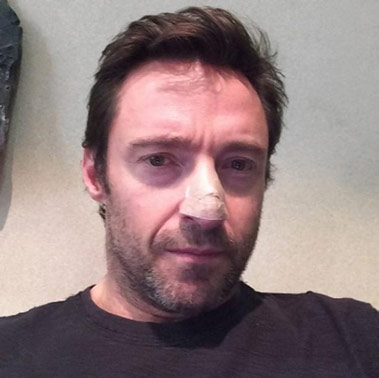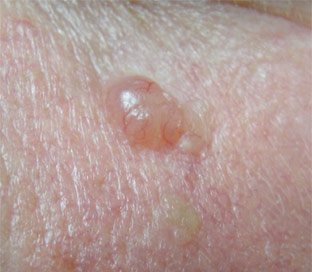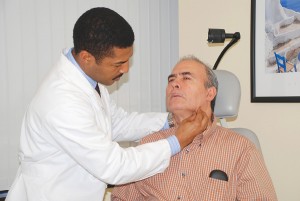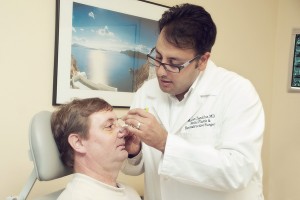- Folded Ear in Newborns: Treatment Options - April 11, 2018
- Newborn Ear Deformity: What Can Be Done? - April 11, 2018
- Ear Molding: An Overview - November 2, 2017
- Otoplasty for Protruding Ears - September 26, 2017
- Basal Cell Carcinoma: Facial Reconstruction Timing - September 26, 2017
- Clinical Considerations of Mohs Reconstruction of Cheek Defect - September 26, 2017
- Basal Cell Carcinoma: Nasal Bridge Reconstruction - September 26, 2017
- Skin Cancers Involving the Eyebrow: Clinical Considerations - October 3, 2016
- Treatment of Multiple Skin Cancer Lesions - June 1, 2016
- Skin Cancer: Nasal Reconstruction and Scar Management - June 1, 2016
 Hugh Jackman, the star of X-men and Wolverine, recently confirmed he underwent treatment for basal cell carcinoma. The actor stated he finally had a spot on his nose evaluated due to his wife’s insistence. This spot unfortunately turned out to be cancerous. He shared a picture of his bandaged nose, after undergoing surgical treatment of his cancer.
Hugh Jackman, the star of X-men and Wolverine, recently confirmed he underwent treatment for basal cell carcinoma. The actor stated he finally had a spot on his nose evaluated due to his wife’s insistence. This spot unfortunately turned out to be cancerous. He shared a picture of his bandaged nose, after undergoing surgical treatment of his cancer.
It is difficult to imagine having a cancer on your nose and not realizing it. However, it’s early stages, it is not uncommon for people to ignore small skin lesions, thinking they are just sun spots or moles. How can you protect yourself?
What is Basal Cell Carcinoma?
Basal cell carcinoma is the most common form of skin cancer. It usually occurs due to excessive sun exposure or UV tanning. Basal cells are normal skin cells that are found in the deep layers of the skin. They may be harmed by excessive UV ray exposure, causing them to mutate into cancerous cells. Although basal cell carcinoma is rarely fatal and does not regularly spread to other sites (metastasize), proper identification and removal by a qualified skin specialist is necessary to avoid complications and disfigurement.
What does basal cell carcinoma look like?

Basal cell carcinoma may be missed because they do not always look concerning. They can appear as:
- Shiny or pearly looking nodule on the skin
- Red patch that is similar to eczema
- White scar like tissue
Basal cell carcinomas typically occur on the surfaces of the body that have the most sun exposure but can also occasionally occur at any other skin site. Typical areas include the ears, nose, neck, hands, or lips. Basal cell carcinomas come in a variety of shapes and sizes. Because of the wide variability of presentations, definitive diagnosis can only be made by a skilled skin specialist and with a biopsy of the suspected lesion.
What are the risk factors?
Common risk factors include:
- Repeated or continual sun exposure
- An inability to tan (people who burn rather than tan)
- Light to fair skin pigment
- Older age
- Family history of skin cancer
How is basal cell carcinoma treated?
Treatment of basal cell carcinoma depends on the location and severity of the cancer. A qualified skin specialist is the best medical professional to determine what treatment would be most suitable for your specific case. Some traditional procedures include surgical excision, Mohs surgery, and cryotherapy.
Why is basal cell carcinoma removed?
Although basal cell carcinoma rarely spreads or becomes life threatening, it is usually removed because it can invade local tissues and cause damage by damaging nearby nerves and blood vessels. Additionally there are rare examples where these lesions can become very aggressive and spread to other sites.
How can I prevent basal cell carcinoma?
Good preventative measures include:
- Decrease sun exposure, especially during midday
- Use sunscreen with an SPF 30 rating or above during sun exposure
- Do no use tanning beds
- If you must be outside during times of heavy sun exposure, wear protective clothing and hats
- Get regular skin checkups, especially if you have a history of skin cancer or other risk factors
Why should a skin specialist treat my basal cell carcinoma?
Skin specialists can clearly determine if your lesion is cancerous and the degree of treatment that is required. The skin specialists of the Osborne Head and Neck Institute are double board certified in otolaryngology (ENT) and plastic and reconstructive surgery. This unique combination of medical specialties allows these physicians to address the functional as well as cosmetic concerns inherent to skin cancer treatment.
For more information about basal cell carcinoma, please contact the Osborne Head and Neck Institute.



